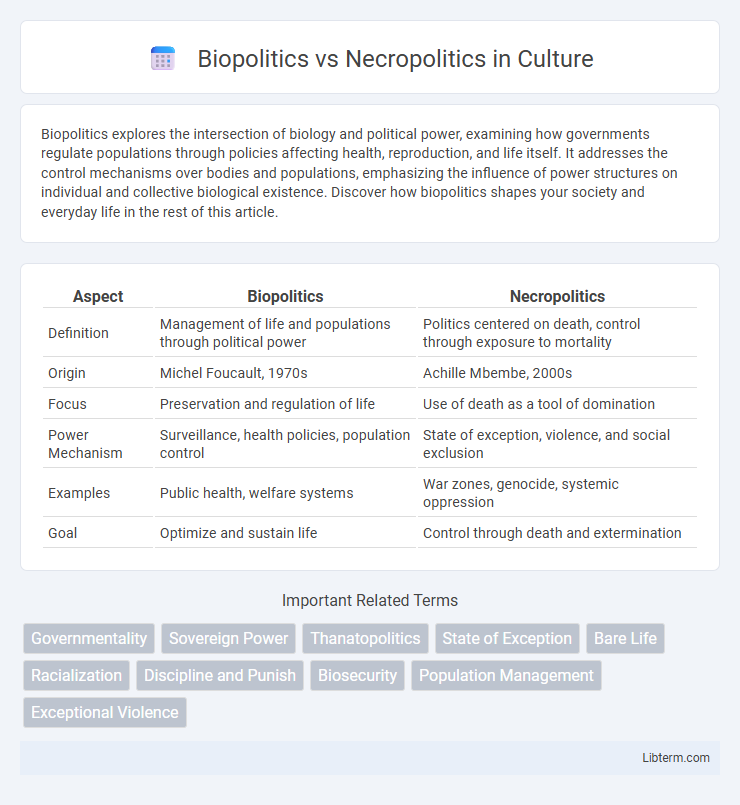Biopolitics explores the intersection of biology and political power, examining how governments regulate populations through policies affecting health, reproduction, and life itself. It addresses the control mechanisms over bodies and populations, emphasizing the influence of power structures on individual and collective biological existence. Discover how biopolitics shapes your society and everyday life in the rest of this article.
Table of Comparison
| Aspect | Biopolitics | Necropolitics |
|---|---|---|
| Definition | Management of life and populations through political power | Politics centered on death, control through exposure to mortality |
| Origin | Michel Foucault, 1970s | Achille Mbembe, 2000s |
| Focus | Preservation and regulation of life | Use of death as a tool of domination |
| Power Mechanism | Surveillance, health policies, population control | State of exception, violence, and social exclusion |
| Examples | Public health, welfare systems | War zones, genocide, systemic oppression |
| Goal | Optimize and sustain life | Control through death and extermination |
Introduction to Biopolitics and Necropolitics
Biopolitics examines the strategies and mechanisms through which governments regulate populations by controlling life, health, and bodies to optimize societal productivity. Necropolitics extends this framework by analyzing how sovereign powers dictate the conditions of death, determining who is permitted to live and who is subjected to death or exclusion. Both concepts critically explore the intersections of power, life, and death within political governance and social control.
Historical Origins and Key Thinkers
Biopolitics, a concept developed by Michel Foucault in the late 20th century, explores the governance of populations through the regulation of life processes, emphasizing power over biological existence and health. Necropolitics, introduced by Achille Mbembe, builds on Foucault's ideas by highlighting the sovereignty exercised through the power to dictate death and expose certain groups to conditions of social and physical elimination. Both frameworks trace their historical origins to modern state formation and colonialism, providing critical insights into mechanisms of control and the political management of life and death.
Defining Biopolitics: Power Over Life
Biopolitics refers to the strategies and mechanisms through which governments regulate populations by managing life processes such as health, reproduction, and biological existence. This concept emphasizes power over life, where sovereign control is exerted to optimize and sustain life within a population. Foucault introduced biopolitics as a mode of governance that contrasts with traditional sovereign power by focusing on the administration and regulation of life rather than the authority to take life.
Understanding Necropolitics: Power Over Death
Necropolitics examines the power structures that determine who lives and who dies, highlighting how sovereign authority controls death as a means of political subjugation. This concept, introduced by Achille Mbembe, contrasts with biopolitics by emphasizing state-sanctioned violence, exclusion, and the creation of "deathworlds" where marginalized populations face systematic annihilation. Understanding necropolitics reveals the mechanisms through which power manifests as control over mortality and the social conditions that render certain lives disposable.
State Control: From Health to Violence
Biopolitics emphasizes state control by managing populations through policies centered on health, reproduction, and life optimization, as described by Michel Foucault. Necropolitics, a concept introduced by Achille Mbembe, extends this framework to include the state's power over death, exercising control through violence, war, and the systematic marginalization of certain groups. This shift highlights how modern states govern not only life but also the potential for death, blending governance with mechanisms of exclusion and mortality.
Biopower in Modern Societies
Biopower in modern societies operates through institutions and practices that regulate populations by managing life processes such as health, reproduction, and mortality. It emphasizes the control and optimization of life, contrasting with necropolitics, which centers on the power to dictate death or expose populations to lethal conditions. Governments employ biopower to enforce public health policies, surveillance, and social norms, shaping individuals' biological existence to maintain social order and economic productivity.
Necropolitics in Contemporary Conflicts
Necropolitics examines how sovereign power dictates the conditions of life and death in contemporary conflicts, often prioritizing the control over death as a means of political dominance. In modern warfare and state violence, necropolitics manifests through targeted killings, massacres, and the systematic exposure of certain populations to death, reflecting a strategy of domination by death rather than life. This framework reveals how contemporary regimes weaponize death to suppress dissent, enforce racial or ethnic hierarchies, and maintain authority through the deliberate creation of "death worlds."
Intersectionality: Race, Gender, and Political Power
Biopolitics and necropolitics intersect with race, gender, and political power by illustrating how state control selectively values certain lives over others, often marginalizing intersectional identities. Necropolitics extends biopolitical strategies by legitimizing death or suffering in populations marked by racial and gendered oppression, revealing systemic violences embedded in political authority. This framework highlights how power structures enforce racialized and gendered hierarchies that determine who is allowed to live and thrive versus who is subjected to exclusion and death.
Critiques and Ethical Implications
Biopolitics, as theorized by Michel Foucault, emphasizes the governance of life through regulatory controls aimed at optimizing population health and productivity, but critics argue it risks marginalizing individual autonomy by prioritizing state interests. Necropolitics, introduced by Achille Mbembe, focuses on the sovereign power to dictate who may live and who must die, spotlighting how systemic violence and state-sanctioned death disproportionately affect marginalized groups. Ethical implications arise from both frameworks, challenging contemporary societies to balance the protection of life with respect for human rights, while scrutinizing the potential for abuse in state mechanisms that govern life and death.
Conclusion: Biopolitics Versus Necropolitics in the 21st Century
Biopolitics in the 21st century emphasizes the governance of life through health, security, and population management, prioritizing vitality and productivity. In contrast, necropolitics exposes the mechanisms of power that dictate death, marginalization, and exclusion, revealing how sovereign authority controls who may live and who must die. Understanding the interplay between these paradigms is crucial for analyzing contemporary social, political, and ethical challenges surrounding life, death, and power structures.
Biopolitics Infographic

 libterm.com
libterm.com